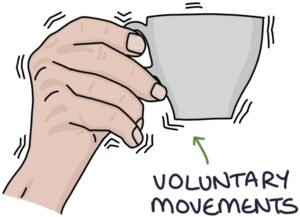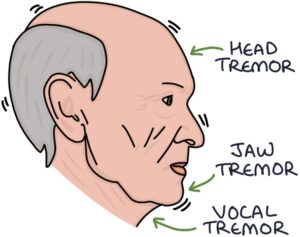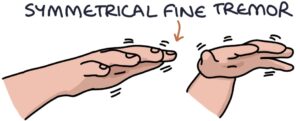Benign essential tremor is a relatively common condition associated with older age. It is characterised by a fine tremor affecting all the voluntary muscles.

It is most notable in the hands but can affect other areas, for example, causing a head tremor, jaw tremor and vocal tremor.

Features
- Fine tremor (6-12 Hz)
- Symmetrical
- More prominent with voluntary movement
- Worse when tired, stressed or after caffeine
- Improved by alcohol
- Absent during sleep

Differential Diagnosis of Tremor
Benign essential tremor is diagnosed clinically based on the presenting features after excluding other causes. The key differential diagnoses of a tremor are:
- Parkinson’s disease
- Multiple sclerosis
- Huntington’s chorea
- Hyperthyroidism
- Fever
- Dopamine antagonists (e.g., antipsychotics)
Management
There is no definitive treatment for benign essential tremor. The tremor is not harmful and does not require treatment if it is not causing functional or psychological problems.
Medications that may improve symptoms are:
- Propranolol (a non-selective beta blocker)
- Primidone (a barbiturate anti-epileptic medication)
Last updated September 2023
Now, head over to members.zerotofinals.com and test your knowledge of this content. Testing yourself helps identify what you missed and strengthens your understanding and retention.

